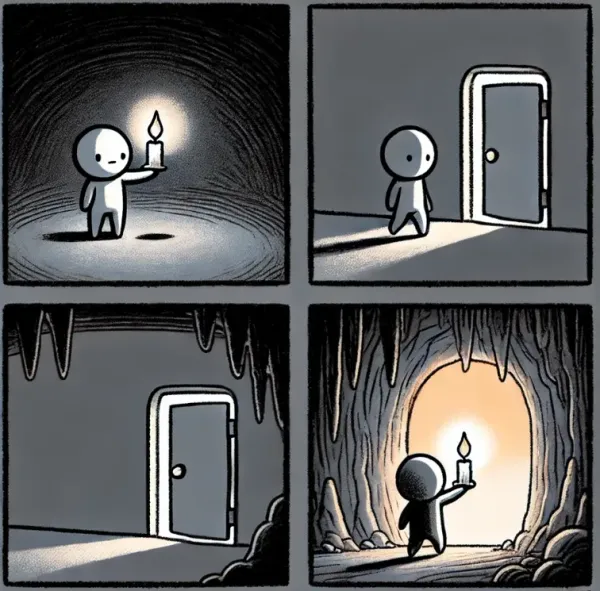How To Be Lucky
What we get wrong about getting what we want

[5 minute read]
There are two contrasting ways of pursuing wealth, power and success. The approach that works the best is also the one most people seem to ignore.

Manifestation is defined as “the ability to cosmically attract success in life through positive self-talk, visualization, and symbolic actions.” The blockbuster 2006 book The Secret has sold over 30 million copies and cemented the concept in the popular consciousness. As of May 2023, TikTok videos tagged “manifestation” have been viewed over 34 billion times. The basic idea is to clearly define what you want and then ask “the universe” to give it to you.
But a recent study found that manifesters are not objectively more successful than non-manifesters. Moreover, they found “manifestation belief was related to risky financial investments and negative financial outcomes as well as overconfident estimates of the likelihood and timeframe for achieving unlikely levels of success.”
Cosmic manifestation sounds a bit bonkers. But to a greater or lesser extent, we all try to manifest our desires. We have been culturally imbued with the ethic of pursuing clearly-defined goals with focus and determination. But I believe manifestation actually becomes problematic the more specific it gets. The risk is that successfully “manifesting” a 6 bedroom Hamptons mansion and a purple Lamborghini might not be your optimal life outcome.
One of my strongest beliefs is that, the older and more widespread a story is, the more evolutionary value it contains. “Be careful what you wish for” is a ubiquitous staple of myths and fairy tales. You go to the witch and ask for a potion… but it comes at a terrible, unexpected price. King Midas wishes for everything he touches to be turned to gold, but that includes his food and even his own daughter. If you hold on too tightly to your goals, you risk locking yourself in a prison of your own making.
Single-minded pursuit of narrow goals blinds us to unintended negative consequences and superior alternatives.
Learning to be Lucky
In stark contrast, “luck” appears to be both quantifiable and trainable. Long-term studies by the psychologist Richard Wiseman have had some wild and amusing results. One of his experiments involved people who defined themselves as lucky and unlucky walking down a street with a $20 bill lying on the pavement. The lucky people noticed it and unlucky people didn’t. Self-defined lucky people weren’t any better at winning random games of chance like the lottery, but they had material advantages when it came to noticing positive opportunities presented by their environment. Jason Zweig tells an appropriate story:
On a lovely morning in May 1994, Barnett Helzberg Jr. was walking past the Plaza Hotel in New York City when he heard someone yell, “Mr. Buffett!” Helzberg turned and saw a woman in a red dress talking to a man he recognized as Warren Buffett. Recalls Helzberg: “I walked up to him and said, ‘I’m Barnett Helzberg of Helzberg Diamonds in Kansas City. I’m a shareholder in Berkshire Hathaway, I really enjoy your annual meetings, and I believe that my company fits your criteria for investments.'”…
… Within weeks, Buffett had bought the company for an undisclosed price. “My luck is uncanny,” says Helzberg. “The more you believe that you’re lucky, the luckier you are.”
Seen through the lens of “luck”, Helzberg was alert to an external opportunity and capitalised immediately. He wasn’t wearing AirPods.
While they seem superficially similar, “lucky” people open themselves up to a wide range of positive outcomes, while manifesters often limit themselves to a single one. Manifesters are so focused on their goal they don’t notice the $20 bills scattered around them. Nor are they able to fluidly switch to superior paths. As Wiseman puts it:
They go to parties intent on finding their perfect partner and so miss opportunities to make good friends. They look through newspapers determined to find certain type of job advertisements and as a result miss other types of jobs. Lucky people are more relaxed and open, and therefore see what is there rather than just what they are looking for. [Emphasis added].
Another one of my strongest-held beliefs is that your flourishing is directly proportional to the amount of intelligence you attribute to things outside of yourself. Lucky people expect positive opportunities from the world, and are responsive to them. In contrast, manifesters make the locus of control their own limited willpower and thoughts. Manifesters often ignore essential external feedback, especially if it conflicts with their internal goals.
How is luck trainable? Wiseman believes meditation can enhance intuition as well as relaxation. When we are anxious, our vision literally narrows. Lucky people vary their routines and seek novelty. They also maximize the number of people they interact with (I have benefitted immensely from approaching people I resonate with online).
It’s nothing short of stunning how often openness comes up as one of life’s most desirable traits. Wiseman found that lucky people scored particularly high on openness in the “Big 5” personality tests. Unsurprisingly, the foundation of luck appears to be being more open to your environment, both physically and emotionally.
Specificially, pursuit of novelty creates “luck”, and curiosity is the emotional manifestation of novelty. If we’re more open to what attracts our attention, we’ll get a lot luckier.
Related Reading/Listening.
Read. The Key to Good Luck Is an Open Mind by Teresa Iafolla in Nautilus (8 minute read)
Why Read: This awesome recommendation from Joel at Future Folklore prompted this whole piece.
[Wiseman] turned these findings into a “luck school” where people could learn luck-inducing techniques based on four main principles of luck: maximizing chance opportunities, listening to your intuition, expecting good fortune, and turning bad luck to good. The strategies included using meditation to enhance intuition, relaxation, visualizing good fortune, and talking to at least one new person every week. A month later, he followed up with participants. Eighty percent said they were happier, luckier people.
Lucky people don’t magically attract new opportunities and good fortune. They stroll along with their eyes wide open, fully present in the moment (a problem for people glued to phone screens). This also means that anything that affects our physical or emotional ability to take in our environment also affects our so-called “luckiness”—anxiety, for one. Anxiety physically and emotionally closes us off to chance opportunities.
Listen. Rory Sutherland on Tetragrammaton with Rick Rubin, (3hr 40 minute listen).
Why listen. This is a long one, but an easy and enjoyable conversation between modern sage Rick Rubin and one of the most interesting people in the world, Rory Sutherland. They get bonus points for bringing up Dr. Iain McGilchrist in the first 5 minutes.
We've created this world where left brain people are free to act on their fairly narrow, rational behaviors without being policed. Whereas the burden of proof demanded of a creative act is literally 20 times greater.
Basically, to me, anecdotes are data, because they're outliers. The fact that we find them interesting suggests that in evolutionary terms they're important, and therefore you shouldn't discount anything as being anecdotal.
Read: Behind The Curtains of Buffett's Life with Alice Schroeder by Frederik Gieschen (35 minute read).
Why read. This is a phenomenal read, even by Frederik’s consistently lofty standards. In the oceans of ink spilled on the icon, Frederik unearths the human, helped by Schroeder's whopping 2,000 hours of interviews. A lot of Frederik’s sources for her insights are now in obscure corners of the internet. In the context of today’s piece I did note this line from Schroeder:
His biggest weakness is the flipside of his strength. He is pretty rigid and he doesn't really listen. He has incredibly firm convictions and is often right, to say the least. But when he is headed down a track that doesn't make sense, he tends to not pay attention to contrary information.




